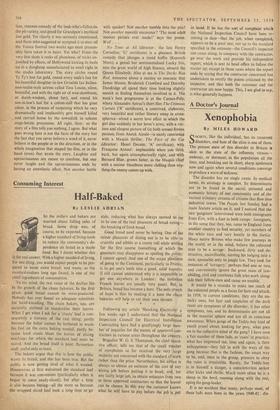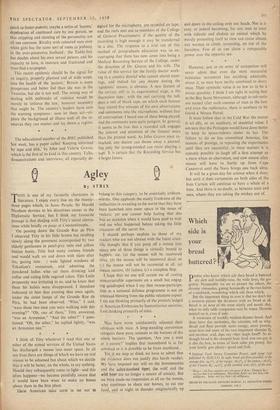A Doctor's Journal
Xenophobia
By MILES HOWARD SOCIETY, like the individual, has its recurrent disorders, and hate of the alien is one of them. The present state of this disorder in Britain is akin to the state of the influenza viruses— endemic, or dormant, in the population all the time, and breaking out in short, sharp epidemics now and again when several conditions converge to produce a wave of sickness.
The disorder has no single cause. In medical terms, its aetiology is complex. Its determinants are to be found in the social, personal and economic history of our community and of the various tributary streams of citizens that flow into industrial towns. The People last Sunday had a main feature article on it, and I noticed that the two 'gangsters' interviewed were both immigrants from Eire, with a foot in both camps : foreigners, in the sense that they, too, came to England from another country to find security, yet members of the white race and very hostile to the darkie. Many native Britons who make few journeys in the world, or in the mind, believe the coloured man to be a savage : backward, dirty and de- structive, uncivilisable, turning his lodging into a stew, amenable only to jungle law. They look for instances of 'savagery,' perhaps find one or two, and conveniently ignore the great mass of law- abiding, civil and courteous folk who work along- side their fellow-men and cause no trouble.
It would be a mistake to make too much of the coloured people as a focus for hate and attack. In 1958, in current conditions, they are the un- lucky ones, but fear and suspicion of the dark races are symptoms of the disorder; it has other symptoms, too, and its determinants are not all in the material sphere and not all in conscious awareness. When gangs of the Teddy-boy kind of youth prowl about, looking for prey, what goes on in the collective mind of the gang? I have seen a fair number of these lads, as 'cases' in practice; what has impressed me, time and again, is their unhappiness—they fall in with the ways of the gang because that is the fashion, the smart way to be, and, once in the group, pressure to obey the rules is irresistible. Rarely, the Teddy-boy is in himself a danger, a conscienceless seeker after kicks and thrills. Much more often he is a sheep in the herd, running along with the rest, aping the gang-leader.
It is no accident that many, perhaps most, of these lads were born in the years 1940-42: dis- Patch to foster-parents, maybe a series of 'homes,' deprivation of continued care by one person, so that crippling and stunting of the personality are all too common. Rivalry with coloured men over white girls has the same sort of roots as jealousy in the over-possessive husband : the Teddy-boy has doubts about his own sexual powers and his capacity to love, is insecure and frustrated and must find a scapegoat.
This recent epidemic should be the signal for an inquiry, properly planned and of wide scope, into the health of the 'patient.' Britain is more prosperous and better fed than she was in the Twenties, but she is not well. The wrong way of dealing with outbreaks of violence would be merely to 'enforce the law,' however necessary that might be. The country's leaders have seen the warning symptoms: now let them act—ex- plore the background of illness with all the re- sources they can muster and lay down a regime.
* * *
The educational number of the BAIL published last week, has a paper called 'Keeping informed by tape and disk,' by John and Valerie Graves, which is the first of its kind in this country. Talks, demonstrations and interviews, all especially de- signed for the microphone, are recorded on tape, and the reels sent out to members of the College of General Practitioners; if the quality of the recording is high enough it may be transferred to a disc. The response to a trial run of this method of postgraduate education was so en- couraging that there has now come into being a Medical Recording Service of the College, under the direction of Dr. Graves and his wife. The value of this service for the family doctor work- ing in a country district who cannot attend meet- ings, and indeed for any doctor during the 'epidemic' season, is obvious. A new feature of the service, still in its experimental stage, is the discussion tape: \\ ith the reel carrying the talk goes a reel of blank tape, on which each listener may record five minutes of his own observations and comments into the microphone, without fear of interruption. I heard one of these being played, and the comments were quite pungent. In general, it seems to be true that a recorded talk engages the interest and attention of the listener more than the printed word. As John Graves once re- marked, any doctor can throw away a journal, but only the strong-minded can resist playing a tape., It is certain that the Recording Service has a bright future.



































 Previous page
Previous page